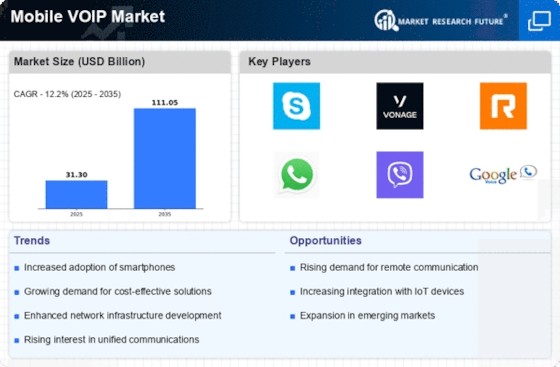Market Analysis
In-depth Analysis of Mobile VOIP Market Industry Landscape
Mobile Voice over Internet Protocol (VoIP) Market development and dynamics are shaped by many market variables. Mobile device adoption and the desire for affordable and flexible communication solutions are important drivers.
Technological advances shape the Mobile VoIP Market. Mobile VoIP systems must adapt to new technologies to improve call quality, dependability, and security as mobile networks grow. Mobile VoIP solutions benefit from WebRTC and VoLTE integration. The industry is constantly evolving as suppliers create solutions for mobile communication's dynamic nature and add capabilities like video calling and multimedia messaging.
Mobile VoIP is affected by smartphone proliferation and high-speed mobile internet expansion worldwide. Mobile VoIP services are in demand as more people utilize cellphones for communication. High-speed mobile internet, including 4G and 5G networks, makes mobile VoIP easy and dependable. Mobile VoIP makes communication easy and economical in developed and emerging economies.
Mobile VoIP market dynamics depend on competition. Many companies provide mobile VoIP solutions, creating severe rivalry. Companies compete by offering high-quality voice calls, new features, and easy-to-use interfaces. The competitive climate motivates providers to innovate to address the changing demands of consumers and companies seeking dependable and affordable mobile communication.
Economics affect the Mobile VoIP Market. The financial condition of individuals and enterprises influences their mobile VoIP adoption. During economic downturns, consumers may seek cheaper communication options, promoting mobile VoIP usage. As economies recover, companies and consumers may invest more in modern communication services, growing the Mobile VoIP Market.
Geopolitics and global events can affect market dynamics. International communication rules, commercial agreements, and geopolitical issues may affect mobile VoIP usage. International cooperation, legislative changes, and global events might influence Mobile VoIP service providers and users.
Mobile VoIP companies must consider customer preferences and industry needs. Enterprise, consumer, and vertical communication demands vary by area and industry. To meet these needs, mobile VoIP vendors must provide specialized and effective communication systems. Vendors must understand and address these industry intricacies to be competitive and fulfill customers' different demands."


















Leave a Comment